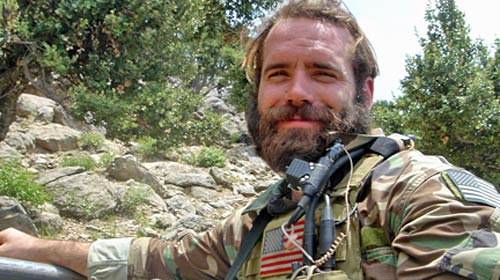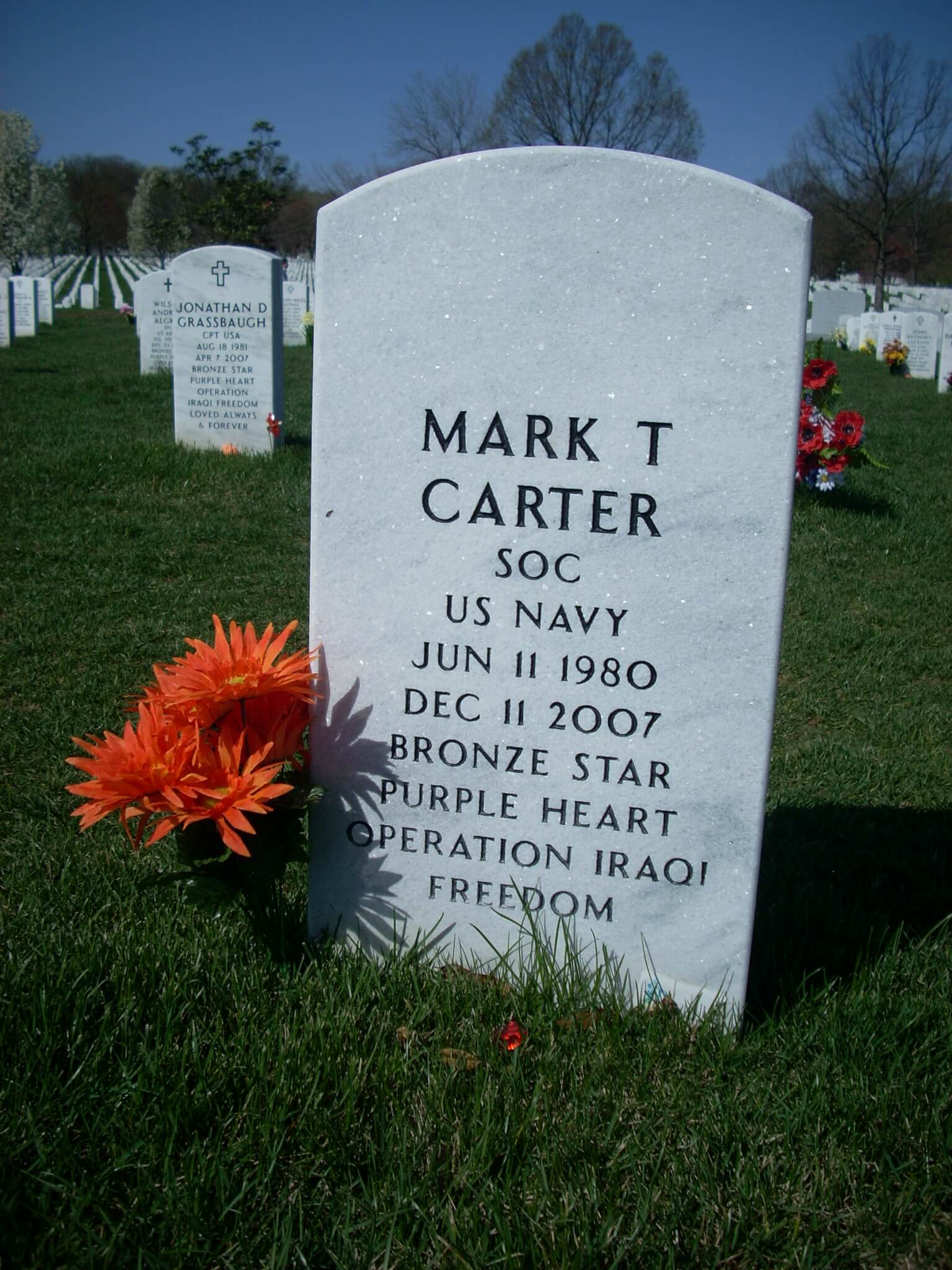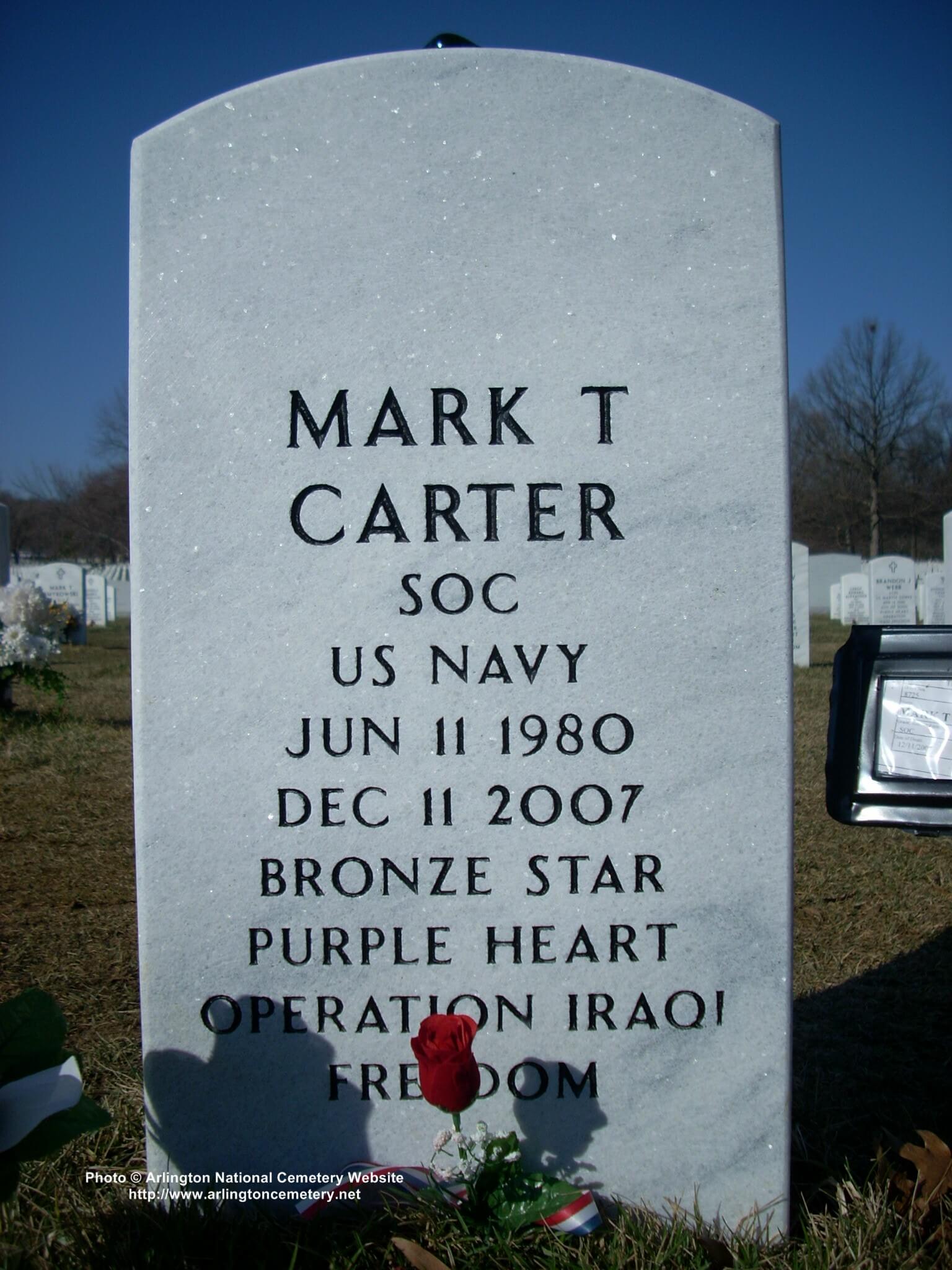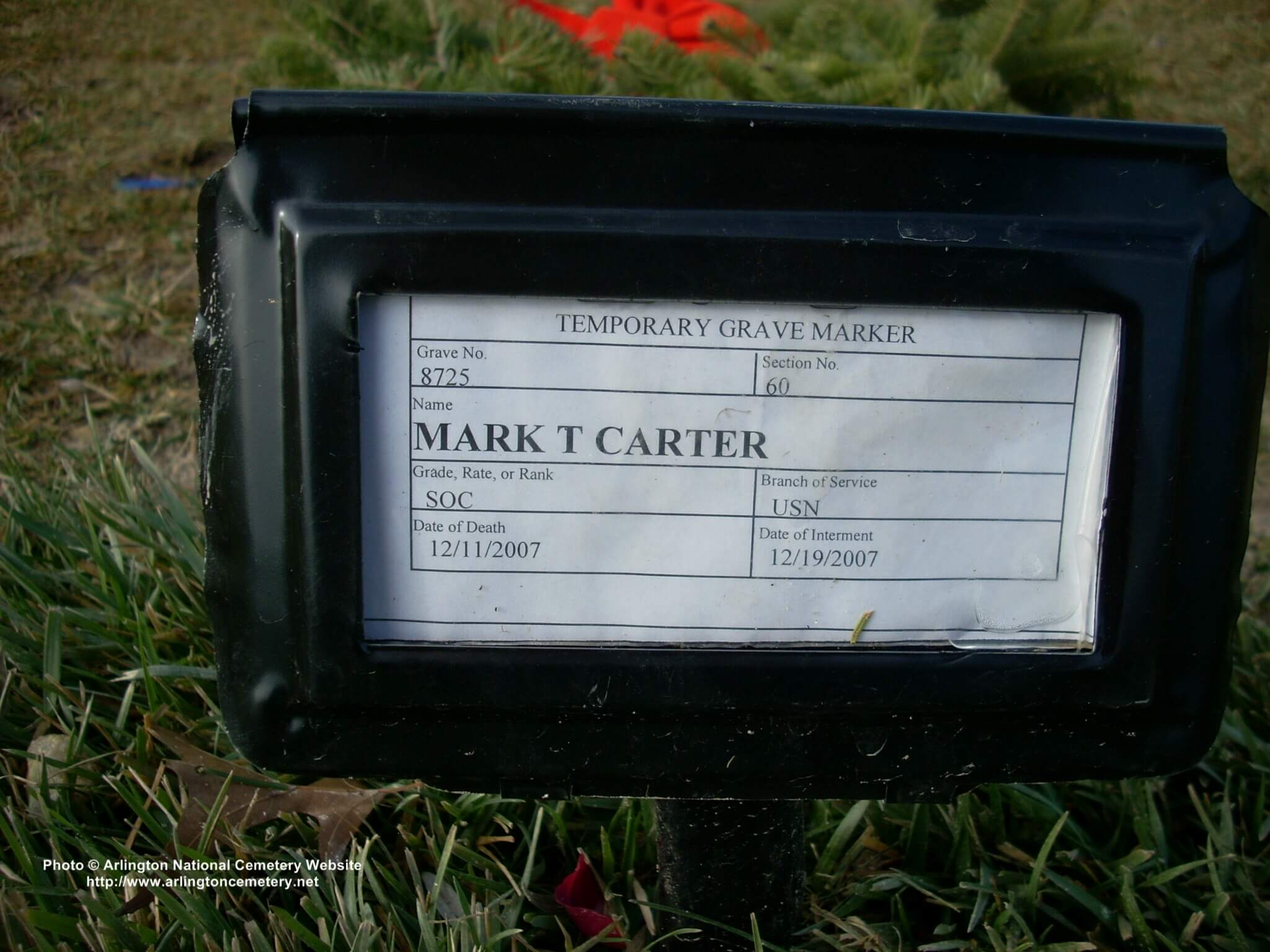U.S. Department of Defense
Office of the Assistant Secretary of Defense (Public Affairs)
News Release
IMMEDIATE RELEASE No. 1404-07
December 13, 2007
DoD Identifies Navy Casualty
The Department of Defense announced today the death of a sailor who was supporting Operation Iraqi Freedom.
Chief Petty Officer Mark T. Carter, 27, of Fallbrook, California, died December 11, 2007, as a result of enemy action while conducting combat operations in Iraq. He was permanently assigned as an East Coast-based Navy SEAL.
By Tony Perry,
Courtesy of the Los Angeles Times
December 23, 2007
It is not unusual for young men to join the Navy in hopes of finding out what they want to do with their lives. But not Mark T. Carter.
He knew exactly what he wanted to do when he joined the Navy after graduating from Fallbrook High School in 1998. He wanted to be a Navy SEAL.
In high school, he had been active in the Mormon Church and Boy Scouts. A former teacher remembered him as polite, disciplined, a bit of a risk-taker. SEAL posters adorned his bedroom.
The son of a doctor, Carter graduated from boot camp at Great Lakes, Illinois, and then Basic Underwater Demolition/SEAL training in Coronado, California. More than half of SEAL students drop out, but not Carter, a stocky 5-foot-5 and outdoor athlete who loved physical challenges.
Once he was in the SEALs, his rise through the ranks was swift. He deployed during the U.S. campaign to topple the Taliban in Afghanistan and then during the early stages of the U.S. mission in Iraq.
His fellow SEALs gave him the nickname Badger after the small but ferocious animal. The name was bestowed after Carter beat a 6-foot-5 opponent in a wrestling match.
Two months ago, Carter got word that he had been promoted to Chief Petty Officer. He e-mailed his friends about his excitement at getting promoted and being part of a SEAL team involved in missions aimed at thwarting the insurgency in Iraq.
The same friends got an e-mail or phone call recently telling them that Carter, 27, had been killed in combat December 11 on an undisclosed mission in Iraq.
Although he had spent much of his career with West Coast SEAL teams, Carter was part of an East Coast team based at Little Creek Naval Amphibious Base in Norfolk, Virginia, when he was killed.
The facts behind his death and earlier service in Afghanistan and Iraq may never be fully known. Like other special forces units, the SEALs keep a tight hold on their identities and the facts behind their missions. His parents, Cindy and Dr. Thomas Carter, now of Council Bluffs, Iowa, have declined to speak to the media.
Although SEALs do multiple tasks, one of Carter’s specialties was keeping team members in radio contact during missions. When team members cannot communicate with each other, high-risk missions can go awry.
“Without a good comm guy, you can’t complete a mission,” said Petty Officer First Class Steve Otten, who teaches at the SEALs school and will soon leave active duty. “Next to the officer in charge, the comm guy is probably the most important. Mark was one of the best.”
Carter’s funeral last week at Arlington National Cemetery was heavily attended by Navy officers and enlisted sailors, many with the security clearance necessary to know the details about his death and prior deployments. At the service, Carter’s family received his third Bronze Star for valor.
Among the speakers was an ensign who went through boot camp and SEALs training with Carter. He praised Carter as the “embodiment of the warrior ethos.” In an interview, the ensign remembered Carter’s upbeat attitude. “You’d be in the ocean and very, very cold, and then look over at Mark,” said the ensign, who began his career in the enlisted ranks. “He’d be grinning and laughing.”
Off-duty, Carter enjoyed rock climbing, mountaineering, diving and shooting. He was not married. “He dedicated his life to being the best SEAL he could be,” the ensign said.
SEAL teams from Coronado were in Afghanistan and then in Iraq before the assault by conventional troops. In Iraq, SEALs searched for biological weapon storehouses, helped direct airstrikes and mapped the routes used by Army and Marine convoys in their race to Baghdad.
In Iraq, Carter was part of a sniper team. “He was the kind of guy who was determined to be the first to kick down a door,” said a fellow sniper, a SEAL who asked to be identified only as Eddie.
Another SEAL, a senior chief petty officer, said that when he had the chance to pick the members of his platoon, Carter was his first choice.
“There were dozens and dozens of guys, but Mark was the best,” the senior chief said. “He had a contagious personality. He always found the sunny skies in the grayest of days.”
Although the SEALs, like other military units, have suffered casualties in Iraq and Afghanistan, the loss of Carter has been particularly painful, the SEALs said.
“You hate to see the space Mark occupied go vacant,” the senior chief said.
Friends of a decorated Navy SEAL who grew up in Fallbrook, California, and died in Iraq this week described him as a quiet, athletic young man whose dream was to join the elite Sea Air Land commandos after high school.
Chief Petty Officer Mark T. Carter, 27, was killed “while conducting combat operations in support of Operation Iraqi Freedom,” the Navy said in a press release Thursday. Navy officials declined to elaborate.
As a SEAL, Carter earned a long list of honors, including two bronze stars with “V” for valor, a Joint Service Commendation Medal with “V” and various other awards for achievement, combat and good conduct.
He is survived by his father, Tom, and mother, Cindy, along with three brothers and four sisters. Carter’s family moved to Northern California, and efforts to contact them were unsuccessful Thursday.
Jonathan Moffat, who grew up with Carter and was a year ahead of him in school, said he was interested in anything that had to do with Navy SEALs or the military.
“I can remember playing paintball with him, and he’d always be the one hiding in the grass, or making cover out of potato sacks,” said Moffat, 28, who now lives in Los Angeles but went to school and church with Carter in Fallbrook. “He always took it one step further. Ever since I can remember, he had Navy SEAL posters up on the wall of his room.”
He added that Carter was well-liked within The Church of Jesus Christ of Latter-day Saints in Fallbrook, where his family attended.
Carter enlisted in the Navy after graduating from Fallbrook High in 1998. He volunteered for SEAL training in Coronado in 1999 and served with two West Coast SEAL teams until 2004, when he was assigned to an East Coast-based team, said Naval Special Warfare spokesman Lt. David Luckett.
Carter was stationed at Naval Amphibious Base Little Creek in Norfolk, Virginia, at the time of his deployment in Iraq.
Beth Moffat, a friend of the Carters when they lived in Fallbrook, said the tightknit Mormon community in Fallbrook has been hit hard by the news of Carter’s death.
“I think we’re all very sad, and he’ll be missed,” she said. “But we believe we’ll be with him and see him again. It doesn’t make the pain any less, but it certainly gives you hope.”
Growing up, Carter was pleasant and focused, said Beth Moffat.
“He was an outstanding young man,” she said, adding that his making the SEAL program was not a surprise. “His goal in life was to be a Navy SEAL —- that’s all he ever wanted to do.”
In a Navy press release, Carter’s commanding officer, who was not identified, was quoted calling Carter an “outstanding SEAL, teammate, and great American.”
“His ultimate sacrifice, the most noble act for any American warrior, is our tragic loss and I urge those who knew him to honor his life, in the best way we know how,” said the unnamed officer, according to the Navy.
CARTER, MARK T
SOC US NAVY
- DATE OF BIRTH: 06/11/1980
- DATE OF DEATH: 12/11/2007
- BURIED AT: SECTION 60 SITE 8725
ARLINGTON NATIONAL CEMETERY
Michael Robert Patterson was born in Arlington and is the son of a former officer of the US Army. So it was no wonder that sooner or later his interests drew him to American history and especially to American military history. Many of his articles can be found on renowned portals like the New York Times, Washingtonpost or Wikipedia.
Reviewed by: Michael Howard




